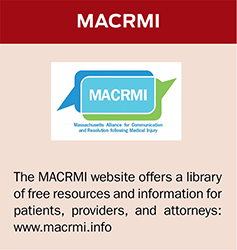Massachusetts Alliance Previews Study Results, Shares Resources at Annual CARe Forum
—Rick Boothman
As the executive director of clinical safety and chief risk officer at the University of Michigan Health System, Rick Boothman, JD, works with patients, families, clinicians, and staff members following cases of medical injury. Boothman started a program at Michigan in July 2001 that established honesty and respect as ground rules for communication, apology, and resolution of cases that traditionally have been ignored, shunned, or—when the subject of malpractice complaints—denied and defended.
Boothman was the closing speaker at the fourth annual forum of the Massachusetts Alliance for Communication and Resolution following Medical Injury (MACRMI), held at the offices of the Massachusetts Medical Society (MMS) in April. The founders of MACRMI were inspired by Boothman’s “Michigan model” and a handful of other programs across the country dedicated to offering open communication, apology, and fair compensation to patients and families harmed by medical care (Beaulieu, 2012). These programs also treat clinicians and staff members with compassion and often offer them emotional support, recognizing that healthcare workers may be traumatized by adverse events involving patients.
MACRMI, launched in 2012, traces its beginnings to a planning grant that MMS and Beth Israel Deaconess Medical Center received from the Agency for Healthcare Research and Quality (AHRQ) in 2010 (Beaulieu, 2012). It is one of a small number of similar programs in the United States, often referred to as DA&O—disclosure, apology, and offer. MACRMI calls its policy “communication, apology, and resolution,” or CARe.
MACRMI offers a sustainable model
In his remarks, Boothman observed that only a small number of hospitals and health systems have been able to implement DA&O programs beyond a limited scope, and few of those programs have survived beyond a short period of time. He praised MACRMI for its comprehensive program: “No one has more thoughtfully, strategically, and sensibly implemented this than the folks who brought you MACRMI.” Boothman credited Alan Woodward, MD, for getting the process started five years before the AHRQ grant, contacting Boothman in 2005 to learn about the Michigan program. Boothman described MACRMI as a “stunning achievement, the best platform I’ve seen.”
To sustain these policies, Boothman says DA&O programs must be dedicated to preventing future harm. The goal must be to improve healthcare delivery—not just to lower malpractice premiums (though there is evidence programs accomplish this) and not even just to do right by people who have been harmed (though that is certainly a priority). According to Boothman, “The most important person is the person we haven’t hurt yet.”
These policies—arguably, all patient safety initiatives—require institutional dedication and resolve. A strong leader can drive these programs and make a difference, but their sustainability must not depend on that one person. Equipping everyone with the tools and training to respond effectively to adverse events supports the core mission of the organization and improves the program’s prognosis.
Defense attorneys and malpractice insurers must also understand that they are part of the organization’s clinical mission, says Boothman. “When you defend care we’re not proud of, you are actually counterproductive to our effort to deliver optimal care.”
Boothman’s message and the mission of MACRMI are dedicated to improvement based on honest examination of care delivery and built on a foundation of organizationwide trust and open communication. In his words, this is the path to success, not only with CARe or DA&O programs, but also with an organization’s financial health and core mission:
If you do this, understand that you are on a path set for success…. Stubbornly stay the course. We do it because it’s the best way to build ownership and accountability, the best way to serve all the people who put their lives in our hands, and all the people who find meaning for their own lives in this work.
Reference
Beaulieu, D. (2012). Disclosure, apology and offer: A new approach to medical liability. Vital Signs, 17(6), 1–2. Retrieved from http://www.macrmi.info/files/3413/5523/9411/final_255939CM_VS_reprint_0812_2.pdf
